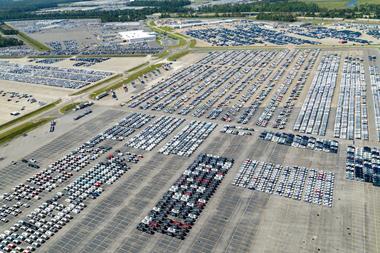
Saturday night’s alright for Ceva
Ceva Logistics has added services for Saturday deliveries to the US from Mexico as part of its Consolidated Border Truck programme (CBT). The Saturday Night Expedite service will ensure the transport of freight that needs to arrive in the Midwest or Ontario, Canada by Monday morning.
The CBT programme was originally developed for freight from the US/Mexican border to support just-in-time plants in the Midwest and Canada.
The Saturday Night Expedite service was designed to answer new delivery demands, particularly for automotive companies that face extra production costs if materials are not delivered on time.
The company reports that 85% of the freight moves on Ceva-owned trucks but that when volumes are especially heavy the company uses its “capacity partners”.
“2011 looks to be another outstanding year as our border truck programme has started very strongly and we are adding valuable new services like the Saturday Night Expedite,” said Ron Wituski, manager of Business Development for Domestic Premium and Expedited Services for Ceva.
Saturday Night Expedite is reported to be generating strong customer interest and already accounts for 20% of the CBT programme, according to the company.
Mahindra makes it big in logistics
Mahindra Logistics, a subsidiary of Indian conglomerate Mahindra Group, has become one of the country’s largest integrated 3PLs following a reported turnover last fiscal year of 1,000 crore ($219m). With a strong focus on automotive supply chain management, the company has provided a variety of logistics services over the past decade since its foundation.
“Our success has been based on our ability to customise our solutions while using the right technology,” said Pirojshaw Sarkari, CEO, Mahindra Logistics. “With investments of over Rs. 10 crores in technology and with a growing focus on transportation, warehousing and international logistics, we are set to become truly globally competitive.”
The company, which is looking for 25% growth this year, recently announced that it was looking for a partner in China as it expands its freight business in new international markets.
Toyota shuts European plants
Toyota is shutting down production at five of its plants in Europe for several days during late April and early May due to parts supply shortages as a consequence of the earthquake that struck northern Japan in March.
The plants affected are, for the production of vehicles, Toyota Motor Manufacturing UK in Burnaston, Toyota Motor Manufacturing Turkey in Adapazari, and Toyota Motor Manufacturing France in Onnaing. The stoppages will also affect the engine manufacturing facilities Toyota Motor Industries Poland (TMIP) in Jelcz-Laskowice and the TMUK Engine Plant in Deeside, Wales.
Last week there were shutdowns at the plants on Thursday and Friday (21 and 22 April) and these will continue for the whole of this week (25 to 29 April). There will also be shutdowns at the plants on 2 May.
“Even though most of our parts come from European suppliers, we are experiencing gaps in our supply chain due to the situation in Japan,” said Didier Leroy, president and CEO of Toyota Motor Europe (TME). “By adjusting our production in Europe, we are adapting to the current situation whilst not completely interrupting our deliveries of vehicles to our customers.”
Klarius supports EU car plants
Automotive aftermarket business the Klarius Group is supporting several EU car plants to maintain continuity of supply following disruptions stemming from the Japanese earthquake.
Having invested heavily in European manufacturing plants over the last three years, the Klarius Group reports that it has found additional manufacturing capacity to satisfy demands for over 100,000 parts per month to keep EU car plants in production.
Klarius chairman Tony Wilson said: “We have been able to provide support for manufacturing sites in other parts of the world [that] are looking to ensure continuity of supply. Items such as water pumps and shock absorbers that we already supply in large numbers to leading car and light vehicle manufacturers have been the first items in demand, with others under urgent consideration.”





















